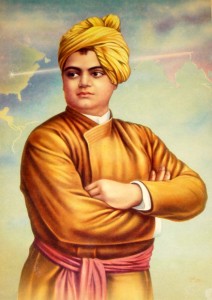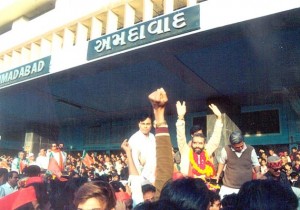By Pushpa Iyer
Swami Vivekananda (born Narendra Nath Datta), was a great Indian philosopher who is credited for reviving Hinduism both in India and the world in the late 19th century. Significant to note is the fact that Vivekananda believed in religious universalism and that no one religion was superior to another. He advocated for social reforms even if it went against the tenants of his religion (Hinduism) and promoted inter-religious dialogue.
So, it is a bit strange at his 150th anniversary, the ones who wanted to celebrate him the most were the Hindu fundamentalist groups like the Rashtriya Swayamsevak Sangh (RSS) and its other front organizations. Foremost in this, was Narendra Modi for whom Vivekananda was a personal hero. The Government of Gujarat declared the year 2012, as the “Year of Youth Power” (Yuva Shakti Varsh) and created a website to honor Vivekanda’s anninvery. Modi authorized as a tweet (his twitter account is not an official Government of Gujarat account) a quote from Vivekananda almost every single day for year more most times with the hashtag #vivekananda150 (Mukopadhyay, Nilanjan 2013). Mukopadhyay also comments on the important role that social media plays for Modi – as his twitter account was not an official account, he was not constrained by the Election Commission rules (2012 being the election year in Gujarat).
 Where are the origins of Modi’s appeal for Vivekananda? Or as put by Kamath, M.V., Randeri, Kalindi 2009, how did Modi’s desire for service to society begin? Although Modi himself in an interview quoted in the same book (pg. 18) attributes it to his mother who prepared and distributed indigenous medicine to children, the authors believe it was Modi’s fascination for Vivekananda where in the roots lie. Apparently, growing up given his interest is spirituality, read almost everything that was written by Vivekananda. The authors refer to Modi being influenced by Vivekananda’s patriotism, however, if Modi truly read Vivekananda, he would know that his brand of patriotism was never exclusionary. It was about being “nationalistic without developing into a nation”.
Where are the origins of Modi’s appeal for Vivekananda? Or as put by Kamath, M.V., Randeri, Kalindi 2009, how did Modi’s desire for service to society begin? Although Modi himself in an interview quoted in the same book (pg. 18) attributes it to his mother who prepared and distributed indigenous medicine to children, the authors believe it was Modi’s fascination for Vivekananda where in the roots lie. Apparently, growing up given his interest is spirituality, read almost everything that was written by Vivekananda. The authors refer to Modi being influenced by Vivekananda’s patriotism, however, if Modi truly read Vivekananda, he would know that his brand of patriotism was never exclusionary. It was about being “nationalistic without developing into a nation”.
Modi himself has never explained the contradiction between him following Vivekananda and at the same time upholding the extremist Hindu values of the RSS and the Sangh Parivar. In one of his interviews he said that “Vivekanda interpreted the Vedas to explain highest forms of spirituality in a simple language in order to rake up inner strength [for] nation building,” A case of selective perception – you read and study only what you want to believe? His silence on the subject maybe interpreted as cognitive dissonance and something that he might not be able to address even to himself.
Should one therefore believe that Modi is nothing but a man with an ambition? He wants to be Prime Minister and nothing will come in its way – even his own values and beliefs? And even though he may have read Vivekananda differently, or had his spiritual experiences in his youth, it is about matching his beliefs to those of the RSS and the Sangh Parivar that will give him his ticket to the Prime Minister’s office? Is he using Vivekanda to advance his own political goals? The answer is in the affirmative for every one of these questions given the many contradictions in his perceptions of Vivekananda and yet, own cannot ignore the idea that what may have started as a genuine spiritual quest for a young Modi somewhere got corrupted in the politics of religion as advanced by the RSS.
Where does Modi’s ambition come from? Topic for another blog.



